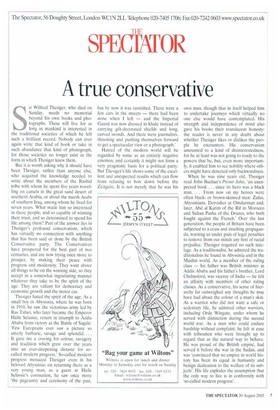A true conservative S ir Wilfred Thesiger, who died on Sunday,
needs no memorial beyond his own books and photographs. These will live for as long as mankind is interested in the traditional societies of which he left such a brilliant record. Nobody can ever again write that kind of book or take in such abundance that kind of photograph, for those societies no longer exist in the form in which Thesiger knew them.
But it is worth asking why it should have been Thesiger, rather than anyone else, who acquired the knowledge needed to write about the members of the Rashid tribe with whom he spent five years travelling on camels in the great sand desert of southern Arabia, or about the marsh Arabs of southern Iraq, among whom he lived for seven years. What made him so interested in these people, and so capable of winning their trust, and so determined to spend his life among them? Part of the answer lies in Thesiger's profound conservatism, which has virtually no connection with anything that has been said or done by the British Conservative party. The Conservatives have prospered for the best part of two centuries, and are now trying once more to prosper, by making their peace with progress and modernity. They want above all things to be on the winning side, so they accept in a somewhat ingratiating manner whatever they take to be the spirit of the age. They are valiant for democracy and economic growth and the motor car.
Thesiger hated the spirit of the age. As a small boy in Abyssinia, where he was born in 1910, he saw the victorious army led by Ras Tafari, who later became the Emperor Haile Selassie, return in triumph to Addis Ababa from victory at the Battle of Sagale: 'Few Europeans ever saw a picture so utterly barbaric, savage and splendid. . .. It gave me a craving for colour, savagery and tradition which grew over the years into an ever-deepening distaste for socalled modern progress.' So-called modern progress menaced Thesiger even in his beloved Abyssinia: on returning there as a very young man, as a guest at Haile Selassie's coronation, he saw once more 'the pageantry and ceremony of the past, but by now it was tarnished. There were a few cars in the streets — there had been none when I left — and the Imperial Guard was now dressed in khaki instead of carrying gilt-decorated shields and long, curved swords. And there were journalists, thrusting and pushing themselves forward to get a spectacular view or a photograph.'
Hatred of the modern world will be regarded by some as an entirely negative emotion, and certainly it might not form a very pragmatic basis for a political party. But Thesiger's life shows some of the excellent and unexpected results which can flow from refusing to bow down before the Zeitgeist. It is not merely that he was his own man, though that in itself helped him to undertake journeys which virtually no one else would have contemplated. His strength and independence of mind also gave his books their translucent honesty: the reader is never in any doubt about whether Thesiger likes or dislikes the people he encounters. His conservatism amounted to a kind of disinterestedness, for he at least was not going to toady to the powers that be, but, even more importantly, it enabled him to see nobility where others might have detected only backwardness.
When he was nine years old, Thesiger read John Buchan's Prester John, `an unexpected book . . . since its hero was a black man.... From now on my heroes were often blackor brown-skinned men: Zulus, Abyssinians, Dervishes at Omdurman and, later. Abd al Karim of the Rif in Morocco and Sultan Pasha of the Druzes, who both fought against the French.' Over the last generation, the people of Britain have been subjected to a crass and insulting propaganda, warning us under pain of legal penalties to remove from our minds any hint of racial prejudice. Thesiger required no such tutelage. As a traditionalist, he admired the traditionalists he found in Abyssinia and in the Muslim world. As a member of the ruling class — his father was British minister in Addis Ababa and his father's brother, Lord Chelmsford, was viceroy of India — he felt an affinity with members of other ruling classes. As a conservative, his sense of hierarchy far outweighed any thoughts he may have had about the colour of a man's skin. As a warrior who did not want a safe or sedentary life, he admired other warriors, including Orde Wingate, under whom he served with distinction during the second world war. As a man who could endure hardship without complaint, he felt at ease with tribesmen who were brought up to regard that as the natural way to behave. He was proud of the British empire, had served it before the war in the Sudan, and was 'convinced that no empire in world history has been its equal in humanity and benign dedication to the welfare of its subjects'. His life explodes the assumption that the only way to live is in conformity with 'so-called modern progress'.


























































 Previous page
Previous page